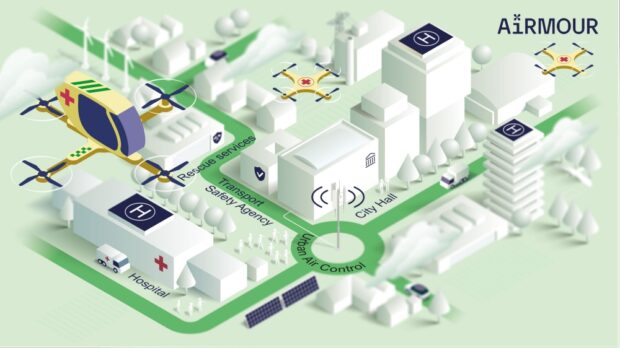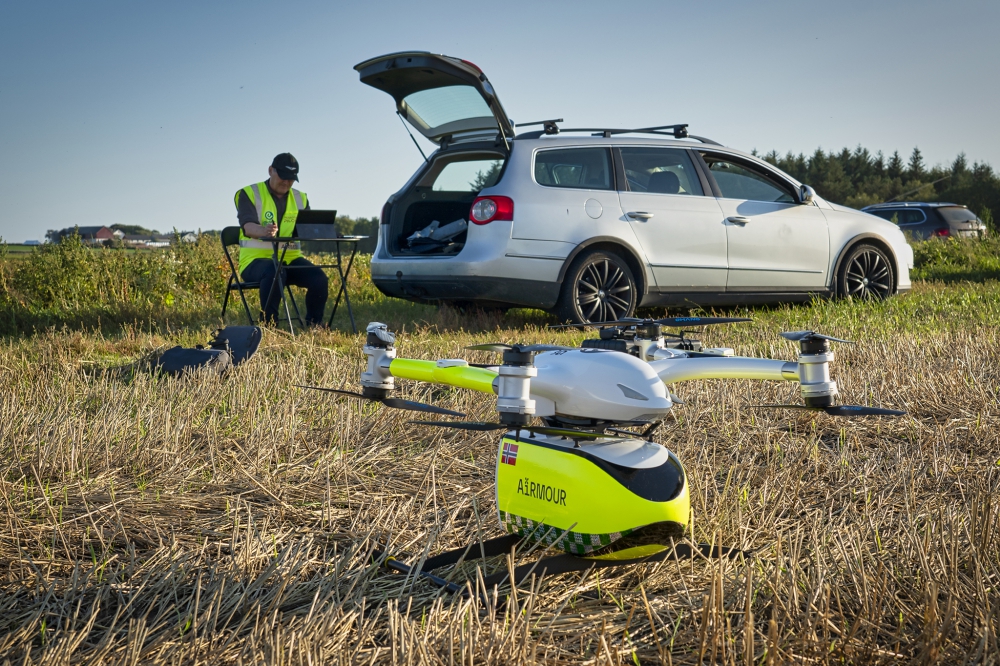has undertaken the most extensive public and stakeholder engagement survey on Urban Air Mobility (UAM) and drones in Europe since EASA’s study in May 2021. Over 1100 citizens participated in the survey from the six countries involved in the AiRMOUR project: Finland, Sweden, Norway, Germany, Luxembourg and the Netherlands.
The questions were related to topics such as safety and risk, privacy, environment, socio-economic impact and public acceptance of different Emergency Medical Service use cases.
A pioneering survey
This survey is the first on this scale that focuses on public attitudes towards the use of delivery drones and passenger eVTOLs for Emergency Medical Services.
‘The results of the survey show that the exposure to drones is likely to increase the acceptance. The more common it is for the public to see professional drones in action, the less controversial the public perceives them’,
says the Coordinator of the AiRMOUR project, Principal Scientist, Doctor Petri Mononen from VTT, Technical Research Centre of Finland.
One of the key findings of the survey was that the public accepts drone usage for urgent medical services – in deliveries of a defibrillator or Emergency Medical personnel, for example – more easily than for non-urgent medical usage, such as deliveries of pharmacy products. However, infrastructure maintenance, land or building surveying and environmental monitoring were seen as the most acceptable use cases for drones.
‘The reason for these findings could be because drones used for medical emergencies, or for maintenance, surveying or monitoring are considered less disturbing than for other uses as they are generally not very frequent, often operating in controlled or isolated environments’,
says Senior Consultant Lucy Mascarenhas from the AiRMOUR partner LuxMobility, which was in charge of conducting the survey.
https://youtu.be/69b75-iMdCk
Citizens concerned about social inequality
A higher level of knowledge increases comfort when new technologies are introduced to the public. The majority of citizens who responded to the AiRMOUR survey were either ‘not knowledgeable at all’ on the topic of Urban Air Mobility or they were ‘slightly knowledgeable’. People who were more knowledgeable and had been exposed to drones were more accepting of them and were more trusting and comfortable with the technology.
Social inequality appeared as a high concern for citizens. This differs from previous studies where inequality has not been highlighted as a concern. To help mitigate this concern the new drone services should benefit the whole of society, not just a select few. However, similarly to the previous studies, topics such as safety, privacy and noise are still the top concerns for citizens.
Experts call for easier testing opportunities
The AiRMOUR survey included interviews of fifteen experts from the fields of aviation, Urban Air Mobility, medical, government, communication and cyber-security, a technical stakeholder survey and a workshop. Experts were asked about acceptance of UAM with focused questions on the Emergency Medical use cases. They felt that regulations are currently the most limiting factor in the advancement of UAM.
‘Experts identified the need for an easier process to enable test flights for drones. However, they acknowledged the need for tighter restrictions in some areas, such as certifying all drones and ensuring all drone operators – including hobbyists – take a mandatory test to fly. They also identified the need for clarity from authorities by ensuring responsibilities and regulatory processes are clear and transparent’,
says Mascarenhas.
According to Mononen, the AiRMOUR project will continue to work on public acceptance as long as the project continues, which is the end of 2023.
‘We expect to greatly increase our survey respondents in 2023 and thereby gain even deeper knowledge on the best follow-up actions for municipalities and the industry’.
To access the 99-page AiRMOUR Public and stakeholder acceptance interim report click here.
To access the 11-page summary of the results click here.
AiRMOUR is a research and innovation project supporting sustainable Urban Air Mobility (UAM) via Emergency Medical Services. The project consortium has a total of 13 partners, including research institutes, aviation authorities, UAM operators and Emergency Medical Service organisations in Finland, Sweden, Norway, Germany, Luxembourg and the Netherlands.
The leading partner is VTT Technical Research Centre of Finland Ltd. Furthermore, the AiRMOUR project has 12 Replicator Cities, and an External Advisory Board with strong international support from organisations such as NASA, Dubai Future Foundation and EASA.
The project will run from 2021 to 2023 and has received funding of approximately €6 million from the European Union’s Horizon 2020 research and innovation programme.
Top Photo: Illustration: Ehang Scandinavia
Middle Photo:Tore Efteland, Ehang Scandinavia
Source: Press Release


